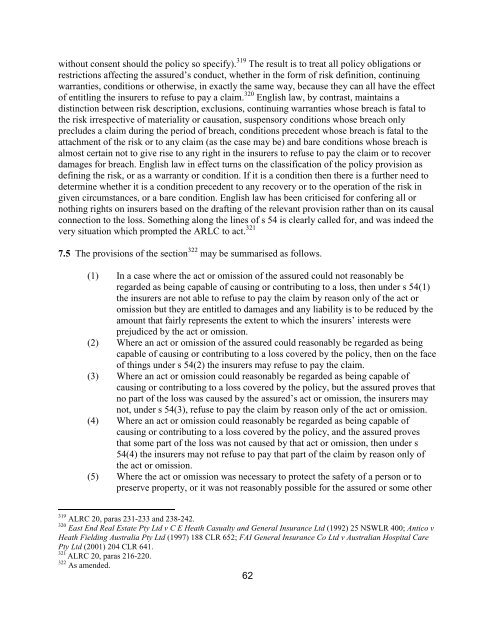REFORMING INSURANCE LAW: - Law Commission
REFORMING INSURANCE LAW: - Law Commission
REFORMING INSURANCE LAW: - Law Commission
Create successful ePaper yourself
Turn your PDF publications into a flip-book with our unique Google optimized e-Paper software.
without consent should the policy so specify). 319 The result is to treat all policy obligations or<br />
restrictions affecting the assured’s conduct, whether in the form of risk definition, continuing<br />
warranties, conditions or otherwise, in exactly the same way, because they can all have the effect<br />
of entitling the insurers to refuse to pay a claim. 320 English law, by contrast, maintains a<br />
distinction between risk description, exclusions, continuing warranties whose breach is fatal to<br />
the risk irrespective of materiality or causation, suspensory conditions whose breach only<br />
precludes a claim during the period of breach, conditions precedent whose breach is fatal to the<br />
attachment of the risk or to any claim (as the case may be) and bare conditions whose breach is<br />
almost certain not to give rise to any right in the insurers to refuse to pay the claim or to recover<br />
damages for breach. English law in effect turns on the classification of the policy provision as<br />
defining the risk, or as a warranty or condition. If it is a condition then there is a further need to<br />
determine whether it is a condition precedent to any recovery or to the operation of the risk in<br />
given circumstances, or a bare condition. English law has been criticised for confering all or<br />
nothing rights on insurers based on the drafting of the relevant provision rather than on its causal<br />
connection to the loss. Something along the lines of s 54 is clearly called for, and was indeed the<br />
very situation which prompted the ARLC to act. 321<br />
7.5 The provisions of the section 322 may be summarised as follows.<br />
(1) In a case where the act or omission of the assured could not reasonably be<br />
regarded as being capable of causing or contributing to a loss, then under s 54(1)<br />
the insurers are not able to refuse to pay the claim by reason only of the act or<br />
omission but they are entitled to damages and any liability is to be reduced by the<br />
amount that fairly represents the extent to which the insurers’ interests were<br />
prejudiced by the act or omission.<br />
(2) Where an act or omission of the assured could reasonably be regarded as being<br />
capable of causing or contributing to a loss covered by the policy, then on the face<br />
of things under s 54(2) the insurers may refuse to pay the claim.<br />
(3) Where an act or omission could reasonably be regarded as being capable of<br />
causing or contributing to a loss covered by the policy, but the assured proves that<br />
no part of the loss was caused by the assured’s act or omission, the insurers may<br />
not, under s 54(3), refuse to pay the claim by reason only of the act or omission.<br />
(4) Where an act or omission could reasonably be regarded as being capable of<br />
causing or contributing to a loss covered by the policy, and the assured proves<br />
that some part of the loss was not caused by that act or omission, then under s<br />
54(4) the insurers may not refuse to pay that part of the claim by reason only of<br />
the act or omission.<br />
(5) Where the act or omission was necessary to protect the safety of a person or to<br />
preserve property, or it was not reasonably possible for the assured or some other<br />
319 ALRC 20, paras 231-233 and 238-242.<br />
320 East End Real Estate Pty Ltd v C E Heath Casualty and General Insurance Ltd (1992) 25 NSWLR 400; Antico v<br />
Heath Fielding Australia Pty Ltd (1997) 188 CLR 652; FAI General Insurance Co Ltd v Australian Hospital Care<br />
Pty Ltd (2001) 204 CLR 641.<br />
321 ALRC 20, paras 216-220.<br />
322 As amended.<br />
62

















